Hotline: +381 61 63 84 071
Civil society advocates forge recommendations ahead of World Humanitarian Summit in Istanbul
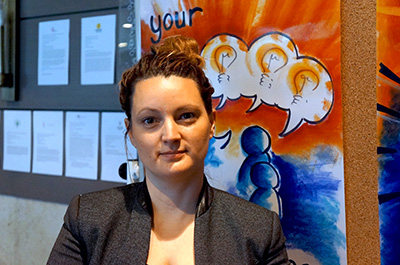
“Rethink your policies and decisions: They force refugee women and girls into the criminal underground economy and into smugglers’ hands. The people we see are not economic migrants. Many are simply trying to save their lives. They have no alternatives except to flee. Think about this, and act.” —Jelena Hrnjk, Atina, an NGO which provides direct support to hundreds of refugee women and girls, particularly those who’ve suffered gender-based violence and human trafficking, in Belgrade, Serbia.
Governments should ensure refugee women’s participation in decisions that affect them, say participants at UN Women-Oxfam “Women on the Move” workshop.
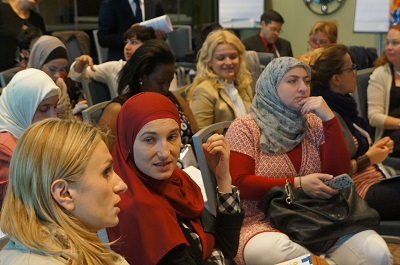
Many of the civil society participants in the Women on the Move workshop were meeting for the first time. Photo: UN Women/John Bleho
Ahead of the World Humanitarian Summit, UN Women and Oxfam brought together more than 50 refugee advocates from 15 countries in Europe, the Middle East and North Africa to formulate a joint position on how to respond to the challenges faced by refugee women and girls.
The Women on the Move workshop, held from 16-18 May in Istanbul, drew participants from a broad range of local and international NGOs and UN agencies who have been on the front-lines of the response to refugee movements created primarily by the conflicts in Syria and Iraq.
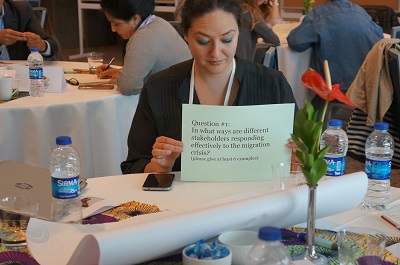
Participants in the Women on the Move workshop discussed several questions before formulating recommendations. Photo: UN Women/John Bleho
They discussed the impacts of current national and international policies on the movement of refugee women and found that many governments are failing in meeting their international obligations, especially to meet refugee women and girls’ needs for protection and asylum.
“The world’s current response to refugees doesn’t match women and girls’ needs,” said Meryem Aslan, Oxfam Country Director for Turkey, at the workshop: “But civil society is increasingly working together. Here, attendees have together developed a set of common recommendations that will be shared at next week’s World Humanitarian Summit in Istanbul.”
Key recommendations for global leaders, detailed in this statement, include the need to:
Address the root causes of the wars in Syria and Iraq;
Ensure greater participation of refugees in programmes that affect them;
Provide safe and legal passages for refugees and migrants;
Establish more transparent, effective and accountable funding mechanisms to support refugees;
Carry out more studies to better understand the positive impact of refugees/ migrants on host countries’ economies;
Amplify the voices of activists supporting the rights of refugees and migrants.
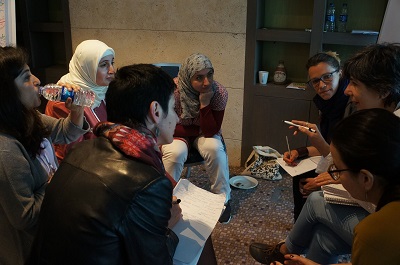
During the workshop, participants spoke about the challenges they face as front-line responders, as well as those of the refugees they support. Photo: UN Women/John Bleho
“Participants decried that governments are prioritizing border security over refugee rights,” said Sabine Freizer, UN Women Policy Advisor for Governance, Peace and Security for Europe and Central Asia: “They also agreed to work together in the coming months to counter xenophobia and advocate for policies and programmes that put refugees first.”
UN Women spoke to several of the participating civil society representatives, asking them to highlight the biggest challenges they, and refugees face today, and what they would say to the world leaders gathering at the World Humanitarian Summit 23-27 May in Istanbul.
Here’s what they had to say*:
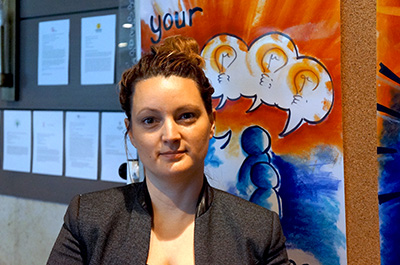
Jelena Hrnjk. Photo: UN Women/John Bleho
“Rethink your policies and decisions: They force refugee women and girls into the criminal underground economy and into smugglers’ hands. The people we see are not economic migrants. Many are simply trying to save their lives. They have no alternatives except to flee. Think about this, and act.” —Jelena Hrnjk, Atina, an NGO which provides direct support to hundreds of refugee women and girls, particularly those who’ve suffered gender-based violence and human trafficking, in Belgrade, Serbia.
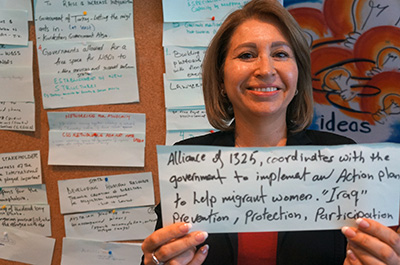
Susan Aref. Photo: UN Women/John Bleho
“Leaders must support women’s organizations as key players in the response to this catastrophe, as key players in dealing with victims. Enhance the partnership between government and civil society to develop this support. Remember: The women’s peace agenda should be your agenda …We must go ministry-by-ministry and to UN agencies and international organizations to put pressure on the government and to get funds to implement UNSCR 1325.” —Susan Aref, Women Empowerment Organization (WEO), an alliance that provides services to women refugees in several camps in Iraq, including social assistance, gender-based violence and legal services, and the distribution of humanitarian aid, while pressuring the government to implement UN Security Council resolution 1325, based in Erbil, Kurdistan Regional Government, Iraq.
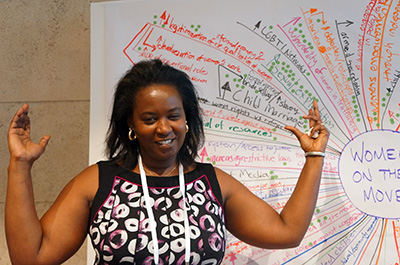
Salome Mutual. Photo: UN Women/John Bleho
“Incorporate gender in planning humanitarian action. Women’s needs are very specific. Refugee women need your support so they can heal from the traumas they’ve experienced. Women must participate in all levels of decision-making. People have different cultural backgrounds and ways of understanding what is out there. All frontline service providers should be sensitive to issues of culture, diversity, conflict and war,” —Salome Mutual, WEZESHA (empower or enable in Swahili), a diaspora-led organization, and the European Network of Migrant Women, a network of 20 organizations from 17 European countries that provides needs assessments of women on the move, both based in Dublin, Ireland.
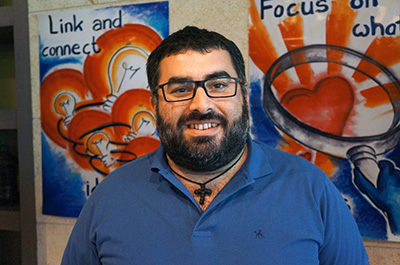
Fadi Hallisso. Photo: UN Women/John Bleho
“Evolve or dissolve. The humanitarian system is badly failing the Syrian people. It is time to rethink this system not only for Syria but for all disasters around the world. Protect civilians, guarantee humanitarian access to difficult, besieged areas, and support Syrian civil society organizations.” —Fadi Hallisso, CEO and co-founder of Basmeh and Zeitooneh, which sets up open-door community centres in high-density, mainly urban areas, with programmes for refugees, including on protection, livelihoods, adult education, arts and culture, based in Beirut, Lebanon.
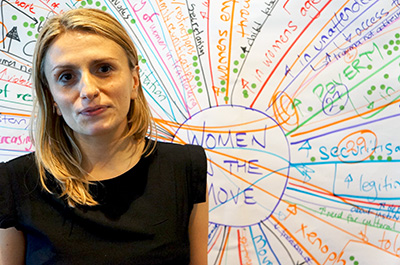
Asja Korbar. Photo: UN Women/John Bleho
“Yes, you do have responsibility to protect the rights of refugee women, children and men, just as strongly as you protect your economic and geopolitical interests.” —Asja Korbar, editor and founding member of Are YOU SYrious?, an NGO that provides support and emergency aid—food, clothes, medicines, information, legal services—to “everybody”: refugees, asylum-seekers, migrants and other stranded people in Croatia.
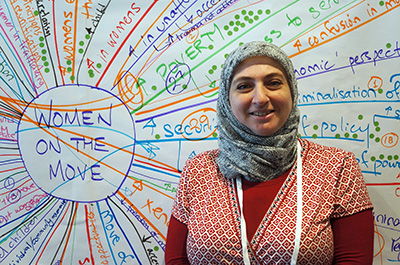
Samah Bassas. Photo: UN Women/John Bleho
“The Syria crisis is not just a crisis in Syria. It has global impact, with more than 4 million refugees. The solution is not serving only those refugees because we have 6.7 million IDPs [internally displaced people] alone inside Syria, people who’ve moved more than once and who deserve services and safety. Ending the crisis is essential to eliminate suffering.” —Samah Bassas, CEO of the Syria Relief Network, an umbrella group of more than 60 organizations inside Syria and neighbouring countries (Turkey, Jordan, Lebanon and Iraq), and a coordinating hub for NGOs and organizations that deliver assistance to Syrians, based in Gaziantep, Turkey.
To read more about the work of each of these civil society organizations and about the challenges they—and refugee women and girls—are facing, read the full version of this story on UN Women’s Regional website for Europe and Central Asia.












 FACEBOOK
FACEBOOK TWITTER
TWITTER YOUTUBE
YOUTUBE